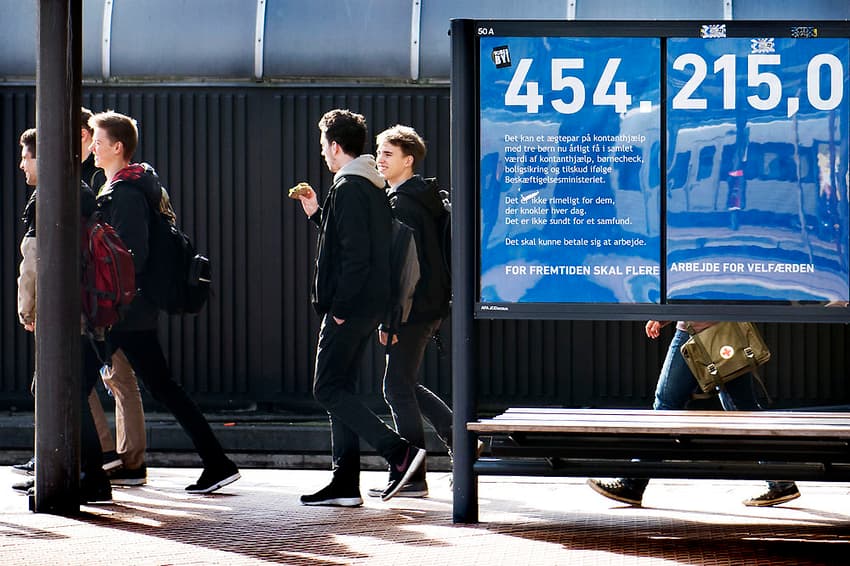Fewer people receiving social welfare payment in Denmark: ministry

December 2018 saw an eight-year low for the number of people receiving Denmark’s basic social welfare payment for unemployment, according to government figures.
A total of 123,800 people received the benefit in the final month of last year, 32,700 fewer than in April 2016 with seasonal variation factored in, the Ministry of Employment wrote in a press statement.
There were also 300 fewer people in the system, known as kontanthjælp in Danish, in December 2018 in comparison with a count the previous month, the ministry wrote.
The system provides basic living support for those who are not working and not covered by the semi-privatised a-kasse unemployment insurance system, and also provides for those who receive the lower integrationsydelse given to recently-arrived refugees who have been granted asylum in Denmark.
The trend applies across the country, according to the ministry press release, with “the vast majority of municipalities having seen a marked reduction [in number of people receiving the basic social welfare], typically over 15 percent across the years 2017 and 2018”.
“It is unbelievably positive that more people are coming away from kontanthjælp, and we must continue to work to make sure this positive trend continues,” employment minister Troels Lund Poulsen said in the press statement.
“January brought the best growth in jobs for 10 years, and we should take advantage of these times to bring more people from the fringes of the jobs market into the working community. That is good for individuals and good for society,” the minister added.
The social welfare trend highlighted by the ministry fits with consistent reports of increasing employment and falling unemployment in Denmark, and business confederations pointing out that companies are sometimes struggling to fill vacant positions.
The government introduced strict new rules on social welfare in 2016, including the so-called kontanthjælpsloft, a limit on the amount a household can be entitled to, and a rule which states that single people must work 225 hours in a year in order to receive the full benefit.
Poulsen said that favourable economic conditions “naturally played a significant role in the positive trend, but I am also convinced that government policies are having an effect.”
Tighter limits on social welfare increase the incentive to work, the ministry writes in the press release, echoing a key 2015 election campaign slogan of the governing Venstre (Liberal) party, which stated that 'it must pay to work'.
READ ALSO: One in ten wage earners in Denmark is a foreign national
Comments
See Also
A total of 123,800 people received the benefit in the final month of last year, 32,700 fewer than in April 2016 with seasonal variation factored in, the Ministry of Employment wrote in a press statement.
There were also 300 fewer people in the system, known as kontanthjælp in Danish, in December 2018 in comparison with a count the previous month, the ministry wrote.
The system provides basic living support for those who are not working and not covered by the semi-privatised a-kasse unemployment insurance system, and also provides for those who receive the lower integrationsydelse given to recently-arrived refugees who have been granted asylum in Denmark.
The trend applies across the country, according to the ministry press release, with “the vast majority of municipalities having seen a marked reduction [in number of people receiving the basic social welfare], typically over 15 percent across the years 2017 and 2018”.
“It is unbelievably positive that more people are coming away from kontanthjælp, and we must continue to work to make sure this positive trend continues,” employment minister Troels Lund Poulsen said in the press statement.
“January brought the best growth in jobs for 10 years, and we should take advantage of these times to bring more people from the fringes of the jobs market into the working community. That is good for individuals and good for society,” the minister added.
The social welfare trend highlighted by the ministry fits with consistent reports of increasing employment and falling unemployment in Denmark, and business confederations pointing out that companies are sometimes struggling to fill vacant positions.
The government introduced strict new rules on social welfare in 2016, including the so-called kontanthjælpsloft, a limit on the amount a household can be entitled to, and a rule which states that single people must work 225 hours in a year in order to receive the full benefit.
Poulsen said that favourable economic conditions “naturally played a significant role in the positive trend, but I am also convinced that government policies are having an effect.”
Tighter limits on social welfare increase the incentive to work, the ministry writes in the press release, echoing a key 2015 election campaign slogan of the governing Venstre (Liberal) party, which stated that 'it must pay to work'.
READ ALSO: One in ten wage earners in Denmark is a foreign national
Join the conversation in our comments section below. Share your own views and experience and if you have a question or suggestion for our journalists then email us at [email protected].
Please keep comments civil, constructive and on topic – and make sure to read our terms of use before getting involved.
Please log in here to leave a comment.